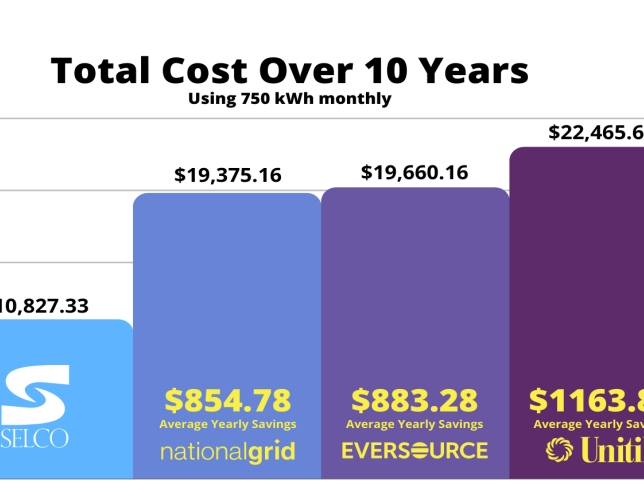Home & Garden
With Big Utility Hikes Coming, Here's How One MA Town Keeps Electricity Cheap
Just a handful of towns in Massachusetts have their own utilities. They are cheaper and much more local than the big utility companies.

SHREWSBURY, MA — Shrewsbury is the envy of the region when it comes to paying the bills.
The town's utility, Shrewsbury Electric and Cable Operations (SELCO), is heading into winter with rates that are slightly higher than last year — but very much lower than ratepayers will face with companies like National Grid, Eversource and Unitil.
Last week, National Grid said that it would raise rates on Nov. 1 to about 33 cents per kilowatt-hour, a 49 percent increase compared to last winter. That's on top of what you pay National Grid to acquire power, plus fees for items like meter readings and rebates for people who own electrical vehicles.
Find out what's happening in Shrewsburywith free, real-time updates from Patch.
But SELCO's total per kilowatt-hour cost for residential ratepayers right now is just under 13 cents per kilowatt-hour, and that's after the town approved a 10 percent rate increase in July. That rate is for all services, including distribution and transmission.
So what's the difference between SELCO and investor-owned utilities like National Grid? Only one has to deliver returns to, well, investors.
Find out what's happening in Shrewsburywith free, real-time updates from Patch.
"Instead of profits going to remote shareholders, SELCO reinvests funds back into the Shrewsbury community through infrastructure improvements, PILOT payments to the town, and economic development," SELCO Director of Advocacy and Customer Experience Jackie Pratt said. "Public power utilities are not for profit, community-owned and locally controlled."
Only 41 cities and towns in Massachusetts offer municipal electric service, serving just 15 percent of the state. Nearby, Princeton, Paxton, Hudson, Holden and the Boylstons offer local electrical service, according to the state Executive Office of Energy and Environmental Affairs. The residents of those communities have a much closer relationship to their utilities compared to big cities like Worcester and Boston that rely on investor-owned utilities.
National Grid's U.S. base is in Waltham, but the headquarters is in London. In March, the company posted an annual operating profit of about 3.9 billion British pounds — or about $4.3 billion U.S. dollars. The company earned almost $1 billion in 2022 from its New England operations alone.
National Grid's stock trades on both the London and New York exchanges. The stock hit a five-year high of about $80 in April, but was down Monday to around $54. Still, National Grid's stock has dipped below the $50 mark only a handful of times since September 2017.
Over the last decade, the cost to buy electricity has remained basically flat in Shrewsbury at just below $100 for 750 kilowatt-hours. Over that same decade, National Grid's price for 750 kilowatt-hours has risen from about $100 in 2012 to close to $200 in 2022, according to SELCO.
The average monthly usage for a residential customer in the U.S. was about 893 kilowatt-hours as of October 2021, according to the U.S. Energy Information Administration.
Shrewsbury's rates are controlled by a public commission whose five members are appointed by the town manager, and whose meetings are open to the public. The chair of the commission is local resident Robert Holland, a former Shrewsbury Youth and Family Services board member and former Navy submarine officer. The chair of National Grid's board is Paula Reynolds, who was previously the CEO of Duke Energy North America and the Safeco insurance company.
But even with low and very stable prices over time, SELCO is not immune to fluctuations in the energy market.
National Grid has said its proposed 49 percent rate hike is due to global shortages of natural gas, which fuels many electric plants. The natural gas market is being stretched by the war in Ukraine because many European nations have stopped buying natural gas from Russia, and have had to buy from the U.S. and Canada instead. Pratt said SELCO ratepayers could see another rate increase this winter.
"Although the analysis is still underway, we do not anticipate anything as significant as some of the increases being discussed by investor owned utilities in the region," she said.
Private utility companies also have a role in preventing municipally-owned utilities. Massachusetts has not had a new municipal electric utility form since 1926. Municipal utility advocates say that's due to a state law that allows private utility companies to effectively veto the formation of new municipal utilities.
State Rep. Michael Kushmerek, D-Fitchburg, and state Sen. John Cronin, D-Leominster, filed legislation in the last session to make it easier for cities and towns to form utilities. The bill stalled in the Senate, and has been introduced numerous times over the last two decades.
Pratt says municipal utilities offer the "superior business model" to private utility companies. Not only are they cheaper, but on average they respond faster to routine power outages.
"Because SELCO is accountable to the Shrewsbury community, we focus on providing the best service at a fair price. That means lower rates and higher customer satisfaction when compared to investor owned utilities," she said.
SELCO and other municipal utilities in Massachusetts will celebrate Public Power Week starting Oct. 2.
Get more local news delivered straight to your inbox. Sign up for free Patch newsletters and alerts.